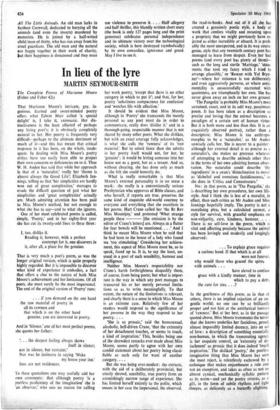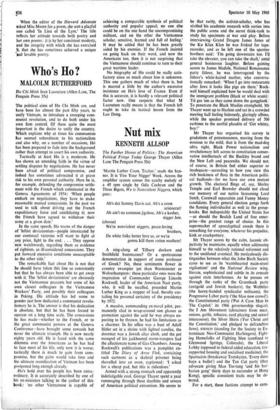The Complete Poems of Marianne Moore (Faber and Faber 42s)
In lieu of the lyre
MARTIN SEYMOUR-SMITH
The Complete Poems of Marianne Moore (Faber and Faber 42s) That Marianne Moore's intricate, gay, in- genious, learned and sweet-minded poetry offers what Edwin Muir called 'a special delight' is, I take it, axiomatic. Her dis- tinctiveness is the least affected of perhaps any living poet's; it is obviously completely natural to her. Her poetry is frequently very difficult—perhaps to the ultimate detriment of much of it—and this has meant that critical response to it has been, on the whole, inade- quate. In dealing with Miss Moore's poetry critics have too easily been able to project their own concerns or deficiencies on to it. Thus W. H. Auden has said that while her approach is that of a 'naturalist,' really her 'theme is almost always the Good Life'; Elizabeth Jen- nings, telling us that 'her simplicities are hardly won out of great complexities,' manages to evade the difficult question of just what her simplicities and 'great complexities' actually are. Much admiring attention has been paid to Miss Moore's method, but not enough to what she has to say—and to what she ignores.
One of her most celebrated poems is called, simply, 'Poetry,' and in her eighty-first year She has cut its twenty-odd lines to these three: I, too, dislike it.
Reading it, however, with a perfect contempt for it, one discovers in it, after all, a place for the genuine.
That is very much a poet's poem, as was the longer original version, which is quite properly highly regarded. But it is impossible to discover what kind of experience it embodies, a fact that offers a clue to the nature of both Miss Moore's achievement and her limitations. Of all poets, she must surely be the most impersonal. The end of the original version of 'Poetry' runs: . . . if you demand on the one hand the raw material of poetry in all its rawness and that which is on the other hand genuine, you are interested in poetry.
And in 'Silence,' one of her most perfect poems, she quotes her father: . the deepest feeling always shows - itself in silence; not in silence, but restraint.'
Nor was he insincere in saying 'Make my house your inn.'
Inns are not residences. , To these quotations one may usefully add her own comments: that although poetry 'is a peerless proficiency of the imagination' she is 'an observer,' who sees no reason for calling her work poetry, 'except that there is no other category in which to put it'; and that, for her, poetry 'substitutes compactness for confusion' and 'watches life with affection.'
It should be evident that Miss Moore, although in 'Poetry' she transcends the 'merely personal as any poet must do in order to communicate, really does 'dislike it,' and in a thorough-going, respectable manner that is not shared by many other poets. What she dislikes, but with an exact courage fully acknowledges, is what she calls the 'rawness' of its 'raw material.' But to admit more than she admits in her poetry itself would not, for her, be 'genuine': it would be letting someone into her house not as a guest, but as a tenant. And so, without cheating, she has done only as much as she felt she could honestly do.
What is really remarkable is that Miss Moore's external personality is in no sense a mask : she really is a conventionally serious Presbyterian who approves of Bible classes, and who herself, if reports are true, preserves the same kind of exquisite old-world courtesy to everyone and everything that she manifests in her poems. Hart Crane called her 'the Rt Rev Miss Mountjoy,' and protested 'What strange people these [the omission is by the editor of Cranes letters] are. Always in a flutter for fear bowels will be mentioned. . . .' And I think he meant Miss Moore when he said that he had been to the house of a lady who found tea 'too stimulating.' Considering her achieve- ment, this aspect of Miss Moore must be, so to speak, faced up to. It is, to say the least, un- usual in a poet of such sensibility, humour and intelligence.
Neither Miss Moores respectability nor Crane's harsh forthrightness disqualify them, of course, from being poets; but what is iMpor- tant is the way in which any poet manages to transcend his or her merely personal limita- tions so as to write meaningfully. To that extent, the nature of the limitations is relevant, and clearly there is a sense in which Miss Moore is an extreme case. Relatively few of her readers would respond to the significance of her persona in the way they respond to her poetry. . . .
She is so prosaic,' said the homosexual, alcoholic, hell-driven Crane, 'that the extremity of her detachment touches, or seems to touch, a kind of inspiration.' This, besides being one of the shrewdest remarks ever made about Miss Moore, seems partly to agree with her own candid statement about her poetry being classi- fiable as such only for want of another category. . . .
But she was being over-modest: she extracts, with the aid of a deliberately provincial, but utterly shrewd, sensibility, true poetry from an astonishingly narrow range of experience. She has limited herself entirely to the polite, which means in her case the impersonal, the observed, the read-in-books. And out of it all she has created a genuinely poetic style, a body of work that confers vitality and meaning upon a propriety that we might previously have re- jected as either incredible or absurd. It is prob- ably the most unexpected, and in its way coura- geous, style that any twentieth century poet has managed to learn from despair. Even _her bad poems (and every poet has plenty of them)— such as the long and sterile 'Marriage,' state- ments that took my fancy which I tried to arrange plausibly,' or 'Rescue with Yul Bryn- nee—where her reticence is too deliberately and even aggressively perverse, or where senti- mentality is unsuccessfully encrusted with quaintness, are triumphantly her own. She has never given away an inch on her own ground.
'The Pangolin' is probably Miss Moore's most sustained, exact, and in its odd way, passionate poem. It has been taken as a description so precise and loving that the animal becomes a paradigm of a certain sort of human virtue. But it is both more and less than this. It is an exquisitely observed portrait, rather than a description; Miss Moore is too anthropo- morphic to be a 'naturalist,' as Mr Auden unwisely calls her. She is nearer to a painter: although her external detail is as precise as a naturalist's, she makes no pretence whatever of attempting to describe animals other than in the terms of her own admiring human obser- vation. No naturalist could describe 'the ingredients' in a swan's 'disinclination to move' as 'disbelief and conscious fastidiousness,' as she does in 'Critics and Connoisseurs.'
No: in that poem, as in The Pangolin,' she is describing her own procedures, her own life- style. And I think she is less of a moralist, in effect, than such critics as Mr Auden and Miss Jennings hopefully imply. The poetry is not a moralising pleat but a calculated answer, a style for survival, with graceful emphases on non-vidgarity, care, kindness, humour. . . . There is no self-love in the ,poem, which is vital and affecting precisely because the animal has been lovingly and modestly and longingly observed: . . . To explain grace requires a curious hand. If that which is at all were not forever, why would those who graced the spires NA. ith animals . . .
have slaved to confuse grace with a kindly manner, time in which to pay a debt, the cure for sins. . . .?
In the gentleness of this poem, as in that of others, there is an implied rejection of an un- gentle world; no one can be so brilliantly proper and not hint at the antithetical horrors of 'rawness.' But at her best, as in the passage quoted above, Miss Moore transmutes the terror that she knows underlies her fastidious, proud, almost impossibly limited decency, into an act of love: a description of something essentially non-human, in which the transmuting agency is her exquisite control, an 'extremity of de- tachment' so prosaic that it does indeed 'touch inspiration.' The disliked 'poetry,' the peerless imaginative thing that Miss Moore has seen she must reject, is relentlessly eschewed by a technique that makes enjambment a rule and not an exception, and takes as often as not an almost cynical, mechanically syllabic pattern as its norm—and yet the poetry returns, as a gift, in the form of subtle rhythms and light rhmyes, as delicately as a butterfly alighting. When the editor of the Harvard Advocate asked Miss Moore for a poem, she sent a playful one called 'In Lieu of the Lyre.' The title reflects her attitude towards both poetry and her own poems: it is by her consistent modesty, and the integrity with which she has exercised )t., that she has sometimes achieved a unique 'Ind lovable poetry.







































 Previous page
Previous page